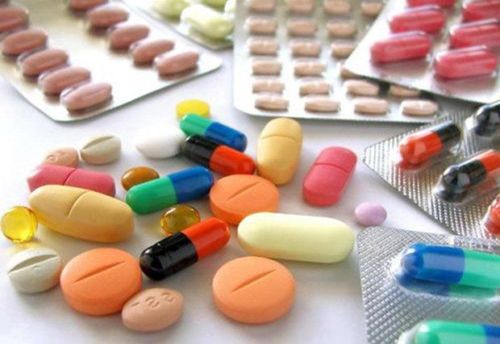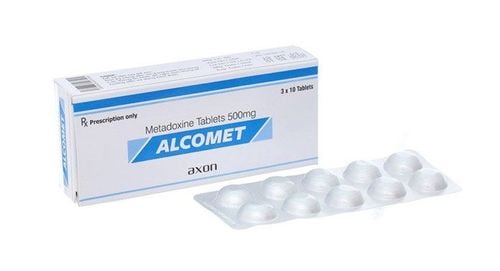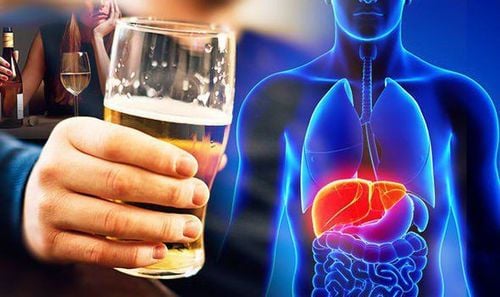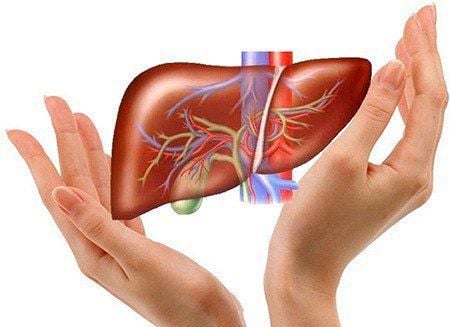This is an automatically translated article.
The article was professionally consulted by Dr. Nguyen Quoc Lan - Department of Medical Examination & Internal Medicine - Vinmec Danang International General HospitalThe liver is a regenerative organ, but every time the liver filters alcohol, some liver cells die. This means that the liver can grow new cells, but prolonged alcohol abuse for many years will reduce the liver's ability to regenerate. Alcohol-related liver disease can cause many dangerous complications. Therefore, the best way to avoid it is to not use all types of alcohol. In case of signs of alcohol-related liver disease, it is necessary to see a doctor for early diagnosis and treatment.
1. What is alcohol-related liver disease (ARLD)?
Alcoholic liver disease is a disease related to liver damage caused by drinking too much alcohol (alcohol abuse). Alcohol-related liver disease usually doesn't cause any symptoms until the liver is severely damaged.
There are two ways alcohol abuse causes alcohol-related liver diseases:
Drinking large amounts of alcohol in a short period of time can cause fatty liver disease and possibly alcoholic hepatitis (uncommon). Drinking more than the recommended limit can cause hepatitis, cirrhosis, and more serious types of alcohol-related liver disease.

Rượu là thủ phạm gây các bệnh lý về gan
2. Signs of alcoholic liver disease
In many cases, people with alcohol-related liver disease do not have any noticeable symptoms until the liver is severely damaged.
2.1. Initial symptoms Signs of alcoholic liver disease will not be obvious at first, such as:
Abdominal pain Eating no appetite Fatigue Feeling unwell Diarrhea
2.2. Severe symptoms As liver damage becomes more severe, symptoms become apparent and the disease becomes severe such as:
Jaundice and yellow eyes Swelling in legs, ankles and feet due to fluid accumulation Swelling in the abdomen caused by fluid buildup (ascites) Severe itchy skin Unusually curved fingertips and fingernails Red palms Loss of weight loss of control Weakness and loss of muscles Memory impairment or confusion Difficulty sleeping ( insomnia) and personality changes, caused by a buildup of toxins in the brain Vomiting blood Bleeding and bruising (such as frequent nosebleeds, bleeding gums)
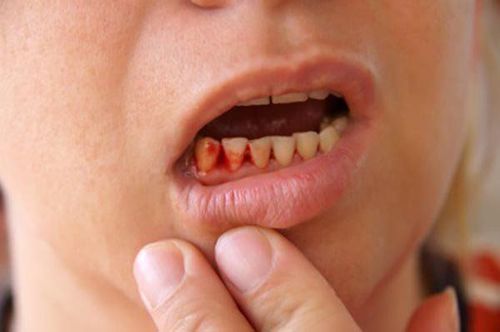
Chảy máu nướu răng là triệu chứng nặng của bệnh gan do rượu
3. Complications of alcohol-related liver disease
Several serious complications can develop if you have alcohol-related liver disease, including:
3.1. Portal hypertension Portal hypertension is a common complication of cirrhosis and alcoholic hepatitis (uncommon). It occurs when the blood pressure inside the liver increases to a severe level.
When the liver is severely scarred, it becomes harder for blood to move. This leads to an increase in the pressure of the blood around the intestines. The blood then has to find a way to return to the heart and it does so using smaller blood vessels. But these blood vessels are not designed to carry blood. So these blood vessels can become dilated and weakened (varicose veins).
If the portal pressure is too high, it will cause varicose veins, leading to the vein wall to split and bleed. This can cause long-term bleeding and lead to anemia. In addition, bleeding can be rapid and large, causing the body to vomit blood and pass stools that are dark like tar.
Varicose veins can be treated by using an endoscope to locate the varicose veins and then using a splint to immobilize the varicose veins.
3.2. Ascites Patients with portal hypertension may also develop fluid accumulation in the abdomen and around the intestines. This fluid is called ascites. Initially, it can be treated with diuretics. But if there is a lot of fluid accumulation, a suction procedure will be used to drain the fluid out.
One of the problems associated with the development of ascites is the risk of infection in the fluid (spontaneous bacterial peritonitis). This is a fairly serious complication and is associated with an increased risk of kidney failure and death.

Hình ảnh bệnh nhân bị cổ trướng
3.3. Hepatic Encephalopathy One of the liver's most important functions is to remove toxins from the blood. If the liver fails to do this due to hepatitis or cirrhosis, the level of toxins in the blood increases. A high amount of toxins in the blood due to liver damage is called hepatic encephalopathy.
Symptoms of the disease are: agitation, confusion, disorientation, muscle stiffness, muscle tremors, difficulty speaking and in very severe cases coma.
Hepatic encephalopathy may require hospitalization to help support body functions and the use of medications to remove toxins from the blood.
3.4. Infections Damage to the liver can weaken the immune system. This can make the body more susceptible to infections, especially urinary and respiratory infections (such as pneumonia).
3.5. Liver cancer Liver damage from drinking alcohol over many years can increase your risk of developing liver cancer. An estimated 3-5% of people with cirrhosis will develop liver cancer each year.
For a healthy liver that means preventing alcohol-related liver diseases, don't drink all alcohol. If you see any unusual signs, you should see a doctor for early diagnosis and treatment. As for alcoholics, support should be given to alcohol addiction to improve their condition.
Please dial HOTLINE for more information or register for an appointment HERE. Download MyVinmec app to make appointments faster and to manage your bookings easily.
Reference source: nhs.uk



